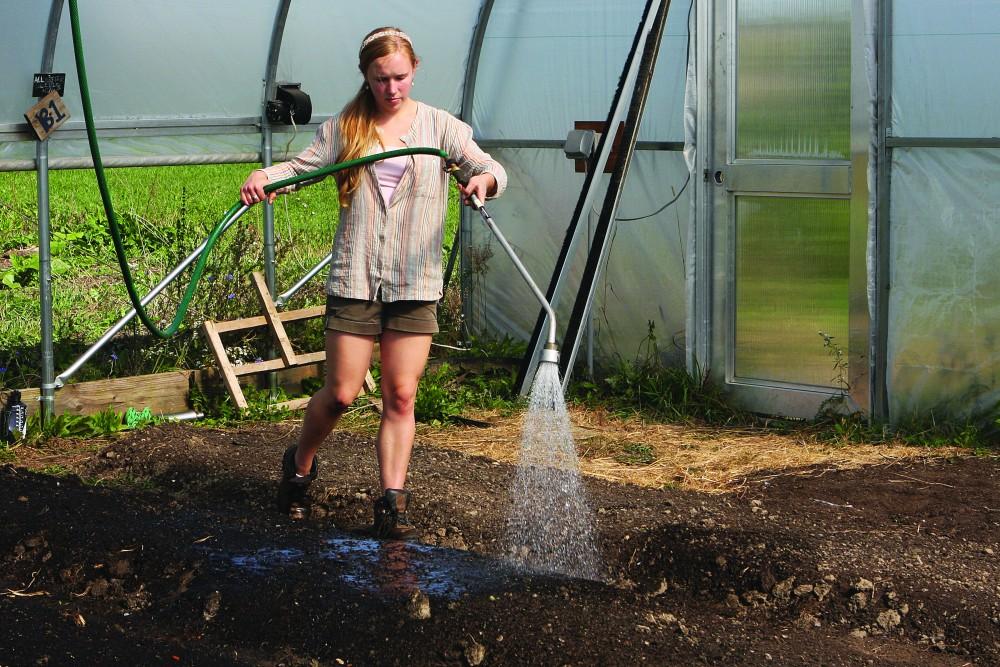Day at the farm

GVL / Ellie Phillips A memeber of the GVSU farm club waters a section of the green house.
Oct 13, 2013
Climbing trees, throwing darts, catching bugs and swinging in hammocks—these are not the things that typically come to mind when people think about Grand Valley State University.
But for the students working at the “farm,” GVSU’s Sustainable Agriculture Project, those activities make up part of their average Friday.
Inside one of the SAP’s two hoop houses—unheated greenhouses relying entirely on the sun for energy—Dana Eardley used a large sprinkler hose to soak down several plant beds that had recently been seeded.
“Germinating seeds need more water than seedlings,” said Eardley, a member of GVSU’s Farm Club. “It’s really variable between transplant and direct seed.”
Inside the germination box—a heavily insulated closet—newly planted seeds are placed to grow. From there, the sprouts are moved into the greenhouse where they develop into seedlings.
The farm offers volunteer hours between 1 p.m. and 4 p.m. on Fridays, which aren’t limited to Farm Club members or students involved in sustainability or agricultural classes.
“We’re very welcoming,” said Youssef Darwich, president of the Farm Club. “Everyone is welcome here.”
Last week, between 10 and 15 students arrived to hang out, have fun and do typical farm work, with a few more coming and going as they pleased.
Some were transplanting seedlings from the greenhouse into the hoop house plant beds. The hoop houses, which act like living refrigerators, extend the growing season so plants can be grown almost year-round at the SAP.
“It’s all about energy efficiency here,” Darwich said.
Darwich spent most of the time creating a rain barrel system by drilling holes in large plastic barrels, putting a rubber seal in the holes and then connecting the barrels with a PVC pipe through the holes. Seven barrels were installed Friday, with plans to install more in the future.
“We’re going to start getting away from hoses, eventually,” said Levi Gardner, manager of the SAP. Together the barrels can hold about 500 gallons of water off of the Wesley House’s roof via the gutter system.
As students arrived at the farm, they headed to get their assignments from Eardley, Darwich or Gardner. In addition to constructing the rain barrel system, this weekend’s projects included: double-digging, a specific way of getting the soil ready to grow plants; weeding spinach beds; and beautifying the outside of the Wesley House by removing weeds and planting various kinds of greenery.
Double-digging is a process that creates “macropores,” or openings in the soil to allow free drainage of water and air flow through it, which allows plants to have an easier time growing roots through the looser soil. The sod, or top layer of soil containing grass and other plants, is removed from an area of a few square feet and placed in a wheelbarrow, which is the first round of digging. Then, the layer of clay below the sod is broken up with pitchforks into small chunks—the second round of digging. The sod from the next area is then placed onto the exposed clay, and the process continues until the whole bed is tilled and raked smooth.
“You need to keep the top soil separate,” Darwich said. “It has all the nutrients.”
Trisha Williams, a volunteer who was there for the first time as part of a service learning project, brought her son out to the farm. Williams, along with several other students, shared a less arduous task—weeding the spinach, lettuce and chard beds.
Hannah Fernando, a Farm Club member, said weeding the plant beds is just routine. “(We weed) every day,” Fernanado said.
This year, major plans for the farm include finishing the herb garden currently in progress in front of the Wesley House and watering it with the rain barrels, as well as creating a permanent walkway and border around the community garden located behind the house. Plans are also in the works to find companies such as Countryside Greenhouse, Home Depot and Lowes that will donate to the Farm, as well as to have a workshop series next year that is LIB 100 approved.
Potential topics of the workshops include how to create a garden, bee keeping, tree planting, natural pest control, canning and making yeast. The club plans to bring in professors to conduct workshops, as well as conduct some of them themselves.
For more information about the Sustainable Agriculture Project, visit www.gvsu.edu/sustainableagproject.

























